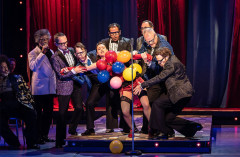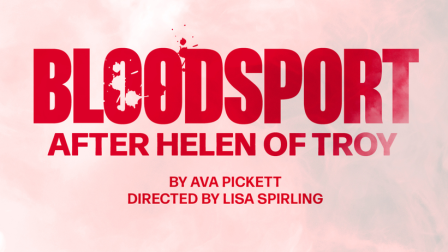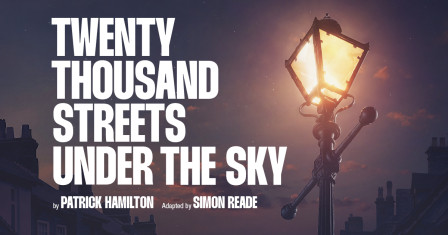Review: ORPHEUS IN THE UNDERWORLD at the Coliseum Theatre
 The Orpheus story seems to be the ancient Greek myth of choice at the moment. Over on Broadway HADESTOWN, which played at London’s National Theatre won the Tony award for best musical (mystifyingly in my opinion) whilst the English National Opera are presenting four interpretations this season.
The Orpheus story seems to be the ancient Greek myth of choice at the moment. Over on Broadway HADESTOWN, which played at London’s National Theatre won the Tony award for best musical (mystifyingly in my opinion) whilst the English National Opera are presenting four interpretations this season.
The respective composers are Gluck, Offenbach, Harrison Birtwhistle and Philip Glass. Each version takes a different slant on the same tale concerning the master musician Orpheus whose music enchants everyone who hears it. When his wife Eurydice is killed by snakes he journeys to Hades/The Underworld and sings so beautifully that the gods allow him to bring his wife back to the living world provided he doesn’t look around at her until they’re safely home.
The operetta version, currently playing at the Coliseum has one massive hit tune. Sometimes known as the Devil’s Gallop, it’s traditionally associate with the Parisian Can-Can dance and it’s so infectiously catchy audiences always go wild for it (although not, alas, in the production)
The popularity of this tune often tempts producers to revive the piece but the trouble is that the plot’s such tedious drivel it’s very difficult to justify putting it on just for that one number and a few other pleasant tunes. These include Orpheus’s lovely song to charm the gods and a number in which Euridyce is sexually molested by the god Jupiter disguised as a fly; the music, inconveniently, in our more enlightened times suggests she rather enjoys it.
And that’s the trouble. None of the original, often misogynist, humour makes comfortable viewing for a modern liberal audience.
Offenbach and collaborators had a hit with it in the mid 1800’s by presenting all the much loved characters from the Greek myth as cruel and venal including the central couple who, in their version, hate each other. In a programme article director Emma Rice explains that she doesn’t like this and has bent the plot to suit her more romantic tastes, intent on making the pair in love which each other beneath their sparring and spats.
The problem is that the music still serves the original, caustic vision and defies you to interpret events romantically no matter how hard Rice tries to hammer square pegs into round holes. She and Offenbach simply do not mesh. She’s an inspiring and innovative director – what a shame the opera company couldn’t find a piece she actually liked and respected for her first outing as an opera director.
There’s a new libretto too from Tom Morris which lands some good laughs with lyrics which actually rhyme, but his attempts to inject gravitas where Rice requires it but where there’s no music to back it up are doomed to failure. No more so then in the Devil’s Gallop which Offenbach delivers as a high spirited romp but which Rice and Morris want to represent as a further molestation of Eurydice, attaching lyrics to express this.
The production is set in the 1950’s, presenting an open-stage rural idyll, the gods living in a white tiled spa and Hades as a sleazy Soho peep show. The character of Public Opinion who pressures Orpheus to rescue his wife when, in the original, he doesn’t want her back, is played as a London black-cab driver, presumably because they’ve long been seen as purveyors of popular opinion and London gossip. Rice is particularly proud of successfully insisting that the production contains a life size replica of a vintage black cab.
Elsewhere balloons are her motif of choice, they represent sheep and when we ascend to the heavens the chorus, as clouds, wear bunches of them like tutus. When Eurydice is humiliated by having to perform in Soho/Hades she enters with more balloons covering her modesty. When they’re popped it represents further abuse.
Elsewhere Lizzie Clachan’s set for Olympus is monumental but lumpen.
As conducted by Sian Edwards the bubbly score never really takes flight and felt to me perversely slow in places. It doesn’t help that opera singers aren’t adept at speaking comic lines which, unamplified, they have to bellow, with few of them demonstrating any gift for comic timing.
And they certainly can’t dance so the finale is an embarrassing series of shuffle hops whilst Mary Bevan swims against the tide as Euridice and tries to service Rice’s vision that she’s being attacked despite the jolly music. Otherwise she and her Orpheus, Ed Lyon, sing sweetly and are good looking and engaging.
The cast is also star studded including a po-faced turn from legend Willard White as Jupiter, in an afro wig, a nice sleazy character turn from Alan Oke as his servant, and a formidable battleaxe of a Juno from Anne-Marie Owens. She and Alex Otterburn as a strutting shameless rock star of a Pluto are the only ones who are effortlessly funny. Everyone else seems to be grimacing “look at us, aren’t we having fun? Isn’t this fun?” like stately relatives trying to get a wedding disco going.
I imagine English National Opera were hoping for a popular hit show that that could be regularly revived. Sadly, I doubt this is it.
Latest News

 Review: UKRAINE UNBROKEN at Arcola Theatre
3 March 2026 at 16:18
Review: UKRAINE UNBROKEN at Arcola Theatre
3 March 2026 at 16:18

 New Cast Announced For MAGIC MIKE LIVE
3 March 2026 at 15:09
New Cast Announced For MAGIC MIKE LIVE
3 March 2026 at 15:09

 World premiere of 'BLOODSPORT: AFTER HELEN OF TROY' at Stratford East announced
3 March 2026 at 12:00
World premiere of 'BLOODSPORT: AFTER HELEN OF TROY' at Stratford East announced
3 March 2026 at 12:00

 Troupe Announces World Premiere of TWENTY THOUSAND STREETS UNDER THE SKY
3 March 2026 at 11:28
Troupe Announces World Premiere of TWENTY THOUSAND STREETS UNDER THE SKY
3 March 2026 at 11:28
